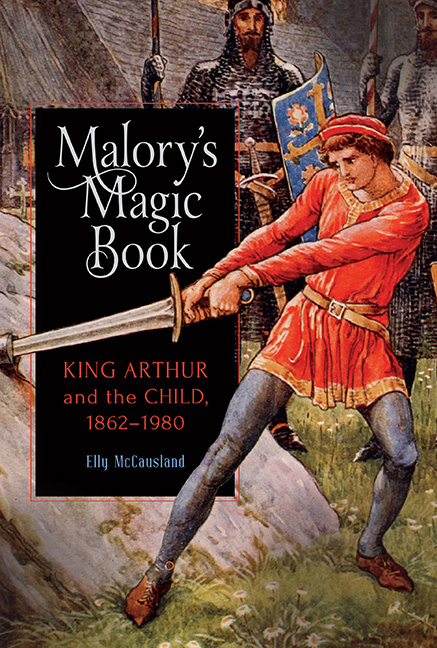Book contents
- Frontmatter
- Dedication
- Contents
- List of illustrations
- Acknowledgements
- A note on names
- Introduction
- 1 ‘Ever fresh and fascinating to the boy and girl of today’: the timeless child and the childish medieval in nineteenth-century Arthuriana
- 2 Risk and revenue: adventurous Arthurian masculinities in the work of Howard Pyle and Henry Gilbert
- 3 The ill-made adult and the mother's curse: psychoanalysing the Arthurian child in T. H. White's The Once and Future King
- 4 ‘Monty Python was not that far away’: the instability of 1950s Arthuriana for children
- 5 ‘For a little while a magician’: potent childish fantasies in John Steinbeck's Acts of King Arthur and his Noble Knights
- Conclusion: At the crossing-places
- Bibliography
- Index
- Arthurian Studies
5 - ‘For a little while a magician’: potent childish fantasies in John Steinbeck's Acts of King Arthur and his Noble Knights
Published online by Cambridge University Press: 04 April 2019
- Frontmatter
- Dedication
- Contents
- List of illustrations
- Acknowledgements
- A note on names
- Introduction
- 1 ‘Ever fresh and fascinating to the boy and girl of today’: the timeless child and the childish medieval in nineteenth-century Arthuriana
- 2 Risk and revenue: adventurous Arthurian masculinities in the work of Howard Pyle and Henry Gilbert
- 3 The ill-made adult and the mother's curse: psychoanalysing the Arthurian child in T. H. White's The Once and Future King
- 4 ‘Monty Python was not that far away’: the instability of 1950s Arthuriana for children
- 5 ‘For a little while a magician’: potent childish fantasies in John Steinbeck's Acts of King Arthur and his Noble Knights
- Conclusion: At the crossing-places
- Bibliography
- Index
- Arthurian Studies
Summary
Towards the end of John Steinbeck's unfinished Acts of King Arthur and his Noble Knights (posthumously published in 1976), Lancelot escapes from the dungeon of four witch queens and lodges with an abbess on his way back to Camelot. During the night, he dreams of Guinevere leaning over him and saying, ‘You can't remake the world. There's little enough you can do to remake yourself.’ Lancelot then appears in the dream ‘with a scaffold about him. And he was taking out bricks from his neck and shoulders and replacing them with others, neatly mortared but new looking.’ This vision of Lancelot ‘remaking’ himself can be contrasted with T. H. White's portrait of the introspective, self-doubting Lancelot, examining his reflection in the polished surface of a helmet, ‘afraid of what he would find’. Where White's Lancelot is wracked with self-doubt and confusion regarding his identity, an affliction that plagues him throughout The Once and Future King, Steinbeck's Lancelot is here actively involved with his own self-fashioning. Contradicting Guinevere's statement, he proceeds to engineer the literal construction of his selfhood. This episode is one of many in Steinbeck's Arthuriad that emphasise the transformative and revelatory power of dreams, particularly in association with the child. It follows an incident in which Lancelot becomes, temporarily, a ‘magician’ through the memory of empowering childhood fantasies, enabling him to understand and outsmart Malory's evil witch queens in a sequence that has the fantastical, ethereal quality of a dream. Drawing heavily on Steinbeck's own memories of being captivated by the ‘wonder and the magic’ of the Morte, aged nine, Acts offers a novel approach to Malory's text through its emphasis on the power of childhood fantasy.
The image of Lancelot remodelling himself out of new bricks is in keeping with Steinbeck's construction of the imaginative child, who ‘remakes’ himself or herself through mental fantasies in order to cope with the demands of growing up. Where previous adaptations such as those by White and Fraser had likened the Morte's characters to children in order to emphasise naivety, petulance, or truncated abnormal development, Steinbeck instead harnesses the magic of childhood fantasies, recalling the ways in which the Morte furnished him with emotional support during his youth as he identified himself with its knights and their predicaments.
- Type
- Chapter
- Information
- Malory's Magic BookKing Arthur and the Child, 1862–1980, pp. 143 - 176Publisher: Boydell & BrewerPrint publication year: 2019
- 1
- Cited by

